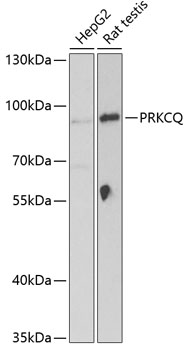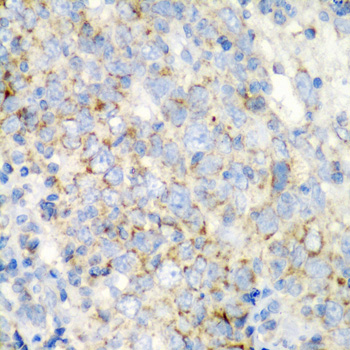Immunology Antibodies 2
Anti-PRKCQ Antibody (CAB5834)
- SKU:
- CAB5834
- Product Type:
- Antibody
- Reactivity:
- Human
- Reactivity:
- Mouse
- Reactivity:
- Rat
- Host Species:
- Rabbit
- Isotype:
- IgG
- Antibody Type:
- Polyclonal Antibody
- Research Area:
- Immunology
Description
| Antibody Name: | Anti-PRKCQ Antibody |
| Antibody SKU: | CAB5834 |
| Antibody Size: | 20uL, 50uL, 100uL |
| Application: | WB IHC |
| Reactivity: | Human, Mouse, Rat |
| Host Species: | Rabbit |
| Immunogen: | Recombinant fusion protein containing a sequence corresponding to amino acids 1-230 of human PRKCQ (NP_006248.1). |
| Application: | WB IHC |
| Recommended Dilution: | WB 1:500 - 1:2000 IHC 1:50 - 1:200 |
| Reactivity: | Human, Mouse, Rat |
| Positive Samples: | HepG2, Rat testis |
| Immunogen: | Recombinant fusion protein containing a sequence corresponding to amino acids 1-230 of human PRKCQ (NP_006248.1). |
| Purification Method: | Affinity purification |
| Storage Buffer: | Store at -20'C. Avoid freeze / thaw cycles. Buffer: PBS with 0.02% sodium azide, 50% glycerol, pH7.3. |
| Isotype: | IgG |
| Sequence: | MSPF LRIG LSNF DCGS CQSC QGEA VNPY CAVL VKEY VESE NGQM YIQK KPTM YPPW DSTF DAHI NKGR VMQI IVKG KNVD LISE TTVE LYSL AERC RKNN GKTE IWLE LKPQ GRML MNAR YFLE MSDT KDMN EFET EGFF ALHQ RRGA IKQA KVHH VKCH EFTA TFFP QPTF CSVC HEFV WGLN KQGY QCRQ CNAA IHKK CIDK VIAK CTGS AINS RETM FHKE RFKI DM |
| Gene ID: | 5588 |
| Uniprot: | Q04759 |
| Cellular Location: | Cell membrane, Cytoplasm, Peripheral membrane protein |
| Calculated MW: | 67kDa/74kDa/81kDa |
| Observed MW: | 82kDa |
| Synonyms: | PRKCQ, PRKCT, nPKC-theta |
| Background: | Protein kinase C (PKC) is a family of serine- and threonine-specific protein kinases that can be activated by calcium and the second messenger diacylglycerol. PKC family members phosphorylate a wide variety of protein targets and are known to be involved in diverse cellular signaling pathways. PKC family members also serve as major receptors for phorbol esters, a class of tumor promoters. Each member of the PKC family has a specific expression profile and is believed to play a distinct role. The protein encoded by this gene is one of the PKC family members. It is a calcium-independent and phospholipid-dependent protein kinase. This kinase is important for T-cell activation. It is required for the activation of the transcription factors NF-kappaB and AP-1, and may link the T cell receptor (TCR) signaling complex to the activation of the transcription factors. |
| UniProt Protein Function: | PKCT: an AGC kinase of the PKC family. A novel PKC: Ca2+ independent but still regulated by PS, DAG and phorbol esters. Contains 2 zinc-dependent phorbol-ester and DAG binding domains. Expressed in skeletal muscle and hematopoietic cells. May play a role in T cell receptor signaling and insulin resistance. Required for TCR-induced NF-kappaB activation in mature T lymphocytes. |
| UniProt Protein Details: | Protein type:Kinase, protein; EC 2.7.11.13; Protein kinase, Ser/Thr (non-receptor); Protein kinase, AGC; AGC group; PKC family; Delta subfamily Chromosomal Location of Human Ortholog: 10p15 Cellular Component: plasma membrane; immunological synapse; cytosol Molecular Function:protein serine/threonine kinase activity; protein binding; protein kinase C activity; metal ion binding; ubiquitin-protein ligase activity; ATP binding Biological Process: positive regulation of interleukin-17 production; axon guidance; phototransduction, visible light; platelet activation; apoptosis; positive regulation of interleukin-2 biosynthetic process; membrane protein ectodomain proteolysis; negative regulation of insulin receptor signaling pathway; protein ubiquitination; protein amino acid phosphorylation; T cell receptor signaling pathway; activation of NF-kappaB transcription factor; rhodopsin mediated signaling; positive regulation of interleukin-4 production; regulation of rhodopsin mediated signaling; regulation of transcription, DNA-dependent; innate immune response; positive regulation of T cell proliferation; regulation of cell growth; positive regulation of T cell activation; inflammatory response; blood coagulation; cell structure disassembly during apoptosis |
| NCBI Summary: | Protein kinase C (PKC) is a family of serine- and threonine-specific protein kinases that can be activated by calcium and the second messenger diacylglycerol. PKC family members phosphorylate a wide variety of protein targets and are known to be involved in diverse cellular signaling pathways. PKC family members also serve as major receptors for phorbol esters, a class of tumor promoters. Each member of the PKC family has a specific expression profile and is believed to play a distinct role. The protein encoded by this gene is one of the PKC family members. It is a calcium-independent and phospholipid-dependent protein kinase. This kinase is important for T-cell activation. It is required for the activation of the transcription factors NF-kappaB and AP-1, and may link the T cell receptor (TCR) signaling complex to the activation of the transcription factors. [provided by RefSeq, Jul 2008] |
| UniProt Code: | Q04759 |
| NCBI GenInfo Identifier: | 334848126 |
| NCBI Gene ID: | 5588 |
| NCBI Accession: | NP_001229342.1 |
| UniProt Secondary Accession: | Q04759,Q14DH6, Q3MJF1, Q64FY5, Q9H508, Q9H549, |
| UniProt Related Accession: | Q04759 |
| Molecular Weight: | 81,865 Da |
| NCBI Full Name: | protein kinase C theta type isoform 2 |
| NCBI Synonym Full Names: | protein kinase C, theta |
| NCBI Official Symbol: | PRKCQ |
| NCBI Official Synonym Symbols: | PRKCT; nPKC-theta |
| NCBI Protein Information: | protein kinase C theta type |
| UniProt Protein Name: | Protein kinase C theta type |
| UniProt Synonym Protein Names: | nPKC-theta |
| UniProt Gene Name: | PRKCQ |
| UniProt Entry Name: | KPCT_HUMAN |








